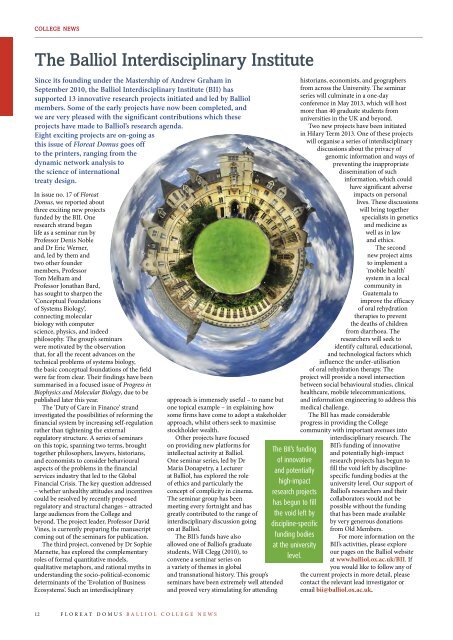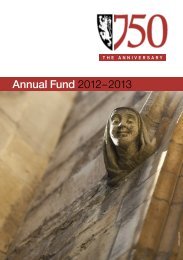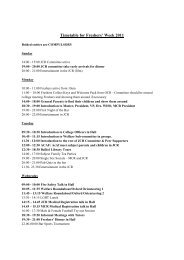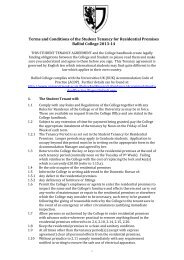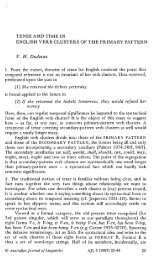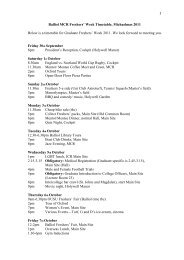Issue 19, 2013 - Balliol College - University of Oxford
Issue 19, 2013 - Balliol College - University of Oxford
Issue 19, 2013 - Balliol College - University of Oxford
Create successful ePaper yourself
Turn your PDF publications into a flip-book with our unique Google optimized e-Paper software.
college news<br />
The <strong>Balliol</strong> Interdisciplinary Institute<br />
Since its founding under the Mastership <strong>of</strong> Andrew Graham in<br />
September 2010, the <strong>Balliol</strong> Interdisciplinary Institute (BII) has<br />
supported 13 innovative research projects initiated and led by <strong>Balliol</strong><br />
members. Some <strong>of</strong> the early projects have now been completed, and<br />
we are very pleased with the significant contributions which these<br />
projects have made to <strong>Balliol</strong>’s research agenda.<br />
Eight exciting projects are on-going as<br />
this issue <strong>of</strong> Floreat Domus goes <strong>of</strong>f<br />
to the printers, ranging from the<br />
dynamic network analysis to<br />
the science <strong>of</strong> international<br />
treaty design.<br />
In issue no. 17 <strong>of</strong> Floreat<br />
Domus, we reported about<br />
three exciting new projects<br />
funded by the BII. One<br />
research strand began<br />
life as a seminar run by<br />
Pr<strong>of</strong>essor Denis Noble<br />
and Dr Eric Werner,<br />
and, led by them and<br />
two other founder<br />
members, Pr<strong>of</strong>essor<br />
Tom Melham and<br />
Pr<strong>of</strong>essor Jonathan Bard,<br />
has sought to sharpen the<br />
‘Conceptual Foundations<br />
<strong>of</strong> Systems Biology’,<br />
connecting molecular<br />
biology with computer<br />
science, physics, and indeed<br />
philosophy. The group’s seminars<br />
were motivated by the observation<br />
that, for all the recent advances on the<br />
technical problems <strong>of</strong> systems biology,<br />
the basic conceptual foundations <strong>of</strong> the field<br />
were far from clear. Their findings have been<br />
summarised in a focused issue <strong>of</strong> Progress in<br />
Biophysics and Molecular Biology, due to be<br />
published later this year.<br />
The ‘Duty <strong>of</strong> Care in Finance’ strand<br />
investigated the possibilities <strong>of</strong> reforming the<br />
financial system by increasing self-regulation<br />
rather than tightening the external<br />
regulatory structure. A series <strong>of</strong> seminars<br />
on this topic, spanning two terms, brought<br />
together philosophers, lawyers, historians,<br />
and economists to consider behavioural<br />
aspects <strong>of</strong> the problems in the financial<br />
services industry that led to the Global<br />
Financial Crisis. The key question addressed<br />
– whether unhealthy attitudes and incentives<br />
could be resolved by recently proposed<br />
regulatory and structural changes – attracted<br />
large audiences from the <strong>College</strong> and<br />
beyond. The project leader, Pr<strong>of</strong>essor David<br />
Vines, is currently preparing the manuscript<br />
coming out <strong>of</strong> the seminars for publication.<br />
The third project, convened by Dr Sophie<br />
Marnette, has explored the complementary<br />
roles <strong>of</strong> formal quantitative models,<br />
qualitative metaphors, and rational myths in<br />
understanding the socio-political-economic<br />
determinants <strong>of</strong> the ‘Evolution <strong>of</strong> Business<br />
Ecosystems’. Such an interdisciplinary<br />
approach is immensely useful – to name but<br />
one topical example – in explaining how<br />
some firms have come to adopt a stakeholder<br />
approach, whilst others seek to maximise<br />
stockholder wealth.<br />
Other projects have focused<br />
on providing new platforms for<br />
intellectual activity at <strong>Balliol</strong>.<br />
One seminar series, led by Dr<br />
Maria Donapetry, a Lecturer<br />
at <strong>Balliol</strong>, has explored the role<br />
<strong>of</strong> ethics and particularly the<br />
concept <strong>of</strong> complicity in cinema.<br />
The seminar group has been<br />
meeting every fortnight and has<br />
greatly contributed to the range <strong>of</strong><br />
interdisciplinary discussion going<br />
on at <strong>Balliol</strong>.<br />
The BII’s funds have also<br />
allowed one <strong>of</strong> <strong>Balliol</strong>’s graduate<br />
students, Will Clegg (2010), to<br />
convene a seminar series on<br />
a variety <strong>of</strong> themes in global<br />
and transnational history. This group’s<br />
seminars have been extremely well attended<br />
and proved very stimulating for attending<br />
The BII’s funding<br />
<strong>of</strong> innovative<br />
and potentially<br />
high-impact<br />
research projects<br />
has begun to fill<br />
the void left by<br />
discipline-specific<br />
funding bodies<br />
at the university<br />
level.<br />
historians, economists, and geographers<br />
from across the <strong>University</strong>. The seminar<br />
series will culminate in a one-day<br />
conference in May <strong>2013</strong>, which will host<br />
more than 40 graduate students from<br />
universities in the UK and beyond.<br />
Two new projects have been initiated<br />
in Hilary Term <strong>2013</strong>. One <strong>of</strong> these projects<br />
will organise a series <strong>of</strong> interdisciplinary<br />
discussions about the privacy <strong>of</strong><br />
genomic information and ways <strong>of</strong><br />
preventing the inappropriate<br />
dissemination <strong>of</strong> such<br />
information, which could<br />
have significant adverse<br />
impacts on personal<br />
lives. These discussions<br />
will bring together<br />
specialists in genetics<br />
and medicine as<br />
well as in law<br />
and ethics.<br />
The second<br />
new project aims<br />
to implement a<br />
‘mobile health’<br />
system in a local<br />
community in<br />
Guatemala to<br />
improve the efficacy<br />
<strong>of</strong> oral rehydration<br />
therapies to prevent<br />
the deaths <strong>of</strong> children<br />
from diarrhoea. The<br />
researchers will seek to<br />
identify cultural, educational,<br />
and technological factors which<br />
influence the under-utilisation<br />
<strong>of</strong> oral rehydration therapy. The<br />
project will provide a novel intersection<br />
between social behavioural studies, clinical<br />
healthcare, mobile telecommunications,<br />
and information engineering to address this<br />
medical challenge.<br />
The BII has made considerable<br />
progress in providing the <strong>College</strong><br />
community with important avenues into<br />
interdisciplinary research. The<br />
BII’s funding <strong>of</strong> innovative<br />
and potentially high-impact<br />
research projects has begun to<br />
fill the void left by disciplinespecific<br />
funding bodies at the<br />
university level. Our support <strong>of</strong><br />
<strong>Balliol</strong>’s researchers and their<br />
collaborators would not be<br />
possible without the funding<br />
that has been made available<br />
by very generous donations<br />
from Old Members.<br />
For more information on the<br />
BII’s activities, please explore<br />
our pages on the <strong>Balliol</strong> website<br />
at www.balliol.ox.ac.uk/BII. If<br />
you would like to follow any <strong>of</strong><br />
the current projects in more detail, please<br />
contact the relevant lead investigator or<br />
email bii@balliol.ox.ac.uk.<br />
12<br />
floreat domus balliol college news


